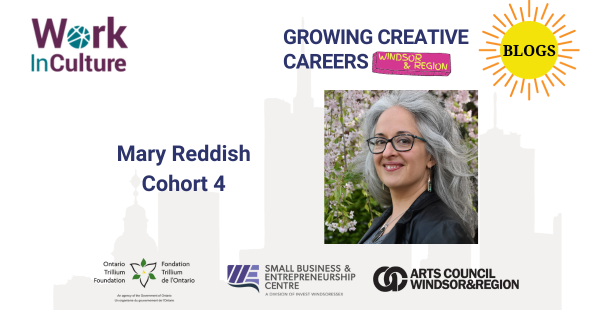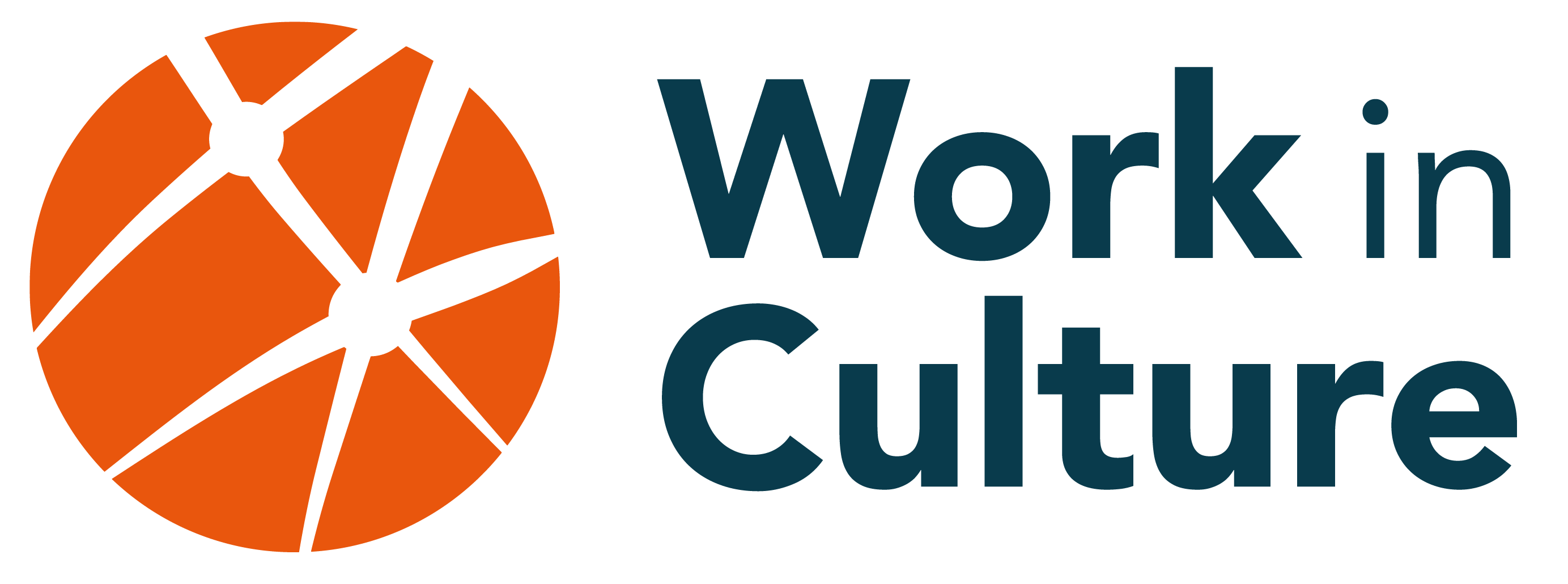
This blog is part of the Growing Creative Careers in Windsor & Region blog series. WorkInCulture worked closely with the Windsor-Essex Small Business & Entrepreneurship Centre and Arts Council Windsor & Region to develop and deliver Growing Creative Careers, a professional development training series for artists and arts workers/arts administrators in the Windsor-Essex region.
Mary Reddish is an aspiring visual artist and writer. She is passionate about lifelong learning, creating, and encouraging others. Just prior to the pandemic Mary decided to take a break from her teaching career; she established a small art studio in her home where she continues to learn and apply the fundamentals of drawing and painting. Mary works in acrylic, pencil, ink, and watercolor, focusing primarily on landscape and portraiture. She also enjoys writing poetry, character sketches, and reflections. Mary is to be found in her studio evenings and weekends, working around her full-time job in the hearing health sector and the other things of daily life.
Mary Reddish is a participant from the fourth cohort of our Growing Creative Careers: Windsor and Region program.
The fourth Growing Creative Careers cohort focused on a series of topics essential for any artist or creative professional looking to build their capacity, and to create or refine an interdisciplinary strategy to support their career. These core topics were marketing, project management, data collection and analysis, and creative entrepreneurship.
Growing Creative Careers – Cohort 4 reflection
by Mary Reddish
The final cohort provided a deep dive into four major topics, which were marketing, project planning, data analysis and business skills. After taking this program, how important do you think it is for an artist/arts worker to have all these skills? Why?
I think these four topics are essential for an artist. To be able to make a living from your art form, you need to know how marketing works, how to find your target audience, and how to reach them in a way that speaks to them personally. Data Analysis can help you better understand how your efforts align (or need to better align) with the market; it can provide feedback as to what to spend more/less time on, determining your next goals, a change in direction, etc. Effective project planning and management is invaluable, especially if you’re the kind of person who, like me, has an endless number of creative interests, or if you tend to be easily discouraged or side-tracked. By having a target goal, a plan, strategies, and routines for achieving that goal, you will be able to run your business with a clear focus — working with a yearly, monthly, and daily perspective. This will enable you to remain consistent, grow, and come through for your clients. Business Skills are probably just as important, if not more, than the actual product. You must know how to manage your business successfully to maintain your reputation and livelihood.
Our partners, the Arts Council Windsor & Region and the Small Business and Entrepreneurship Centre, were present to provide an overview of their resources during this cohort. How has finding out about their service helped you with your artistic process?
It was great to have everyone there. Having representatives from the Arts Council and the SBEC showed me that Windsor has a supportive, strong, collaborative Arts and Culture sector. This is a partnership community that cares about making valuable contributions to the local community, investing in Windsor-Essex by encouraging arts workers to produce their art forms in our region (even if also using virtual methods of running their business). In the past when I thought about the possibility of working full-time as an artist, I used to think that I’d have to relocate to another city where the arts were more prominent — besides, wouldn’t Paris, France, or Florence, Italy be nice? — but these organizations have helped me see that by being arts workers here in Windsor-Essex we are directly prospering our community: its culture, its economy, and its tourism. They have also helped me to see the possibilities of connecting with the local arts sector.
What is one major takeaway or piece of advice from the program (and/or your experience) that you’d like to share with others who are trying to advance their artistic careers/creative careers/creative projects?
There was a ton of learning that happened during this cohort’s meetings. In my opinion, the content was easily the equivalent of a semester’s worth of learning material. Because there was so much worthwhile content, and because there was a lot of good discussion between everyone there, it’s hard to choose just one major takeaway or piece of advice from the program. If you are starting out, the first thing I would share is to first get very good at what your art form is. You cannot hope to have a thriving business without this; you need to be consistent and keep developing your skills. This will also help you find your own style. No matter where you are in your artistic career journey, whether you’re thinking about a career in the arts, already working part or full-time as an arts worker, or a seasoned artist, you will definitely learn a lot in the sessions offered by Work In Culture. I highly recommend them. Additionally, you get to meet new people in the art sector, get some fresh ideas, honest feedback, and a broader perspective. Not to mention they provide you with delicious lunches!
What are some of the needs you see when it comes to improving career development for artists, creative professionals, and/or arts and culture organizations in the Windsor-Essex Region?
I imagine that learning good business skills probably ranks high in terms of career development. Knowing how to run a physical and/or online business is the only way to be able to be an arts worker. Otherwise, the art form is just a hobby. I suspect most “artist-types” are not usually “business-types” which makes this a real need. I also think there is a need for mentorship. Having the opportunity to learn alongside more seasoned arts business professionals is important for newer/emerging artists. I think this is something that has nothing to do with the age of either party and that both mentors and mentees learn from each other; sometimes, for example, the mentor is younger in age but significantly more experienced and knowledgeable in their field. If we are willing, we can learn from each other regardless of our age, or stage in life.
What are you looking forward to next (professionally)?
Although I’m not young, I would consider myself a developing newer artist; I have a small studio where I’ve established a daily art practice. I am looking forward to improving the quality of my work to the point where I feel I can consistently produce work that will captivate viewers in a memorable and meaningful way, and with archival quality that will maintain its integrity for generations to come. Also, I have a teaching background and sometimes I think about finding a way to enrich the lives of others through teaching art, perhaps having my own teaching studio. I guess you can say that I’m still figuring things out, but that’s okay because I know I’ll never stop growing my art journey and learning all that I possibly can. I currently work a day job that is not in the arts sector, and I have two more children going to university, but as my nest progressively empties, I look forward to my art practice expanding into something professionally new in my life even if I’m not exactly sure what that looks like just yet. This Growing Creative Careers course has provided great resources and has helped me see that this is possible.
If you are an artist or creative professional looking to build your capacity or refine an interdisciplinary strategy to support your career, you can find downloadable templates provided to participants of the program below:
- Project Timeline & budget chart
- Project Initiation Document
- Project Management for creatives and art professionals
- Data Collection & Analysis
- Terms of reference
- SWOT assessment
To download these templates and learn more about the Growing Creative Careers: Windsor & Region program, please visit workinculture.ca/programs/growing-creative-careers-windsor-region.
